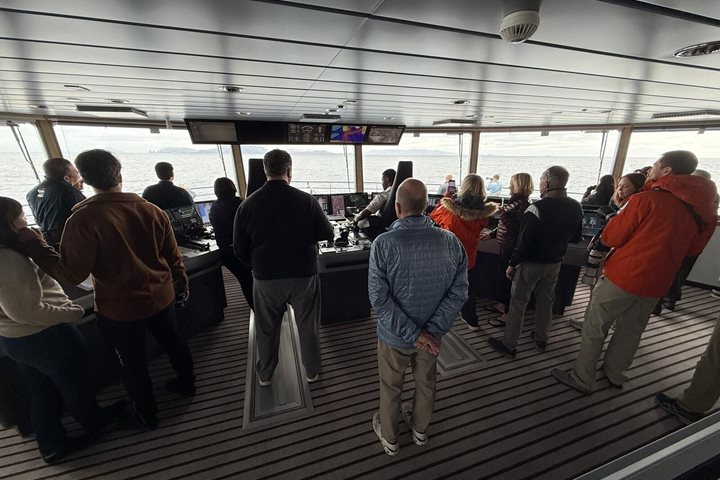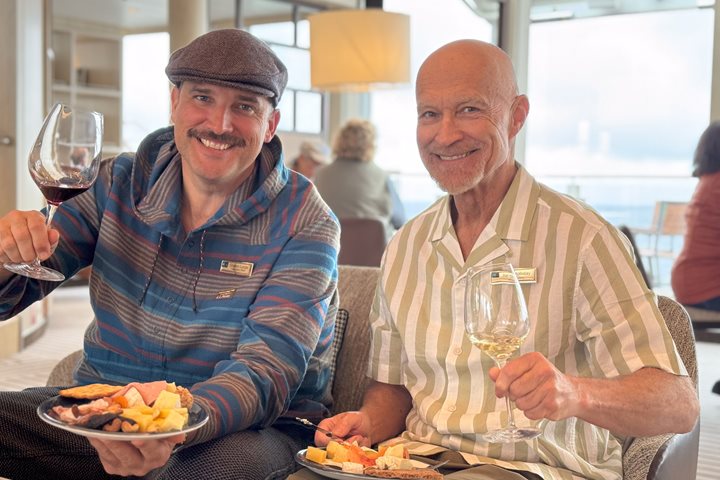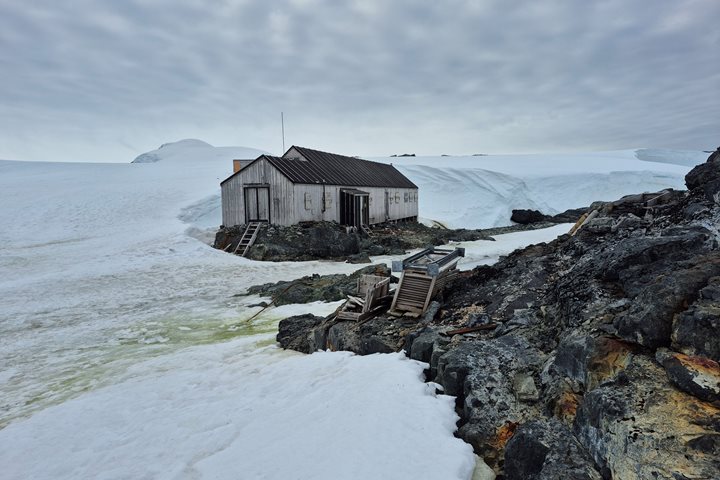We have left the White Continent behind us. We have said our farewells to the breathtaking magnificence of an ice-age landscape with its overwhelming majesty. The continent holds in its icy grasp an awesome power, one sufficient to change our world, still locked into its vast ice cap and ice sheets.
We bade farewell last night to the Black Nunataks, the stark blackness of the rock, the multi-hued whiteness of the snow and ice, and to the very last of that extraordinary color that the continent offers—the pure, monochromatic blue so captivating that we have taken myriad photographs of it in the cracks and crevices of both bergs and glaciers. Surely no one has been untouched by the astonishing depth of that color.
This morning, when we woke, the continent already lay far behind us and out of sight. We were pushing our way ever northwards and into the infamous Drake Passage, though technically we were still south of the convergence and so ecologically we were still in the realm of the southern continent. A gentle snow was falling softly and the decks and superstructure of the National Geographic Explorer had been whitened with a covering layer of lingering snow. The falling whiteness gave even our bright orange lifeboats a touch of class.
It was as if the great White Continent was reaching out icy fingers towards us, beckoning us back south to the continent of ice and the time of ice. Perhaps the echoes of that grasp, our memories and our images, will draw us back again to the extraordinary experience that is a voyage to white land in the south.
As the day passed our onboard team offered talks and education on a range of subjects from the scientific work of The United States Antarctic Program (Ken Taylor), On Assignment with National Geographic (Sisse Brimberg and Cotton Coulson), to the Ross Sea—The Other Side (Magnus) and Sir Ernest Shackleton and the Imperial Transantarctic Expedition 1914-1917 (Steve Maclean), then our final briefing and recap paying homage to the extraordinary photographic works of Frank Hurley.
Meanwhile, outside we were trading the infamously "screaming sixties" for the merely "furious fifties" though for us today these latitudes have remained relatively benign. A long reaching swell had soothed our sleep last night, but the morning brought a leaden, confused sea with whitecaps, and though the seas became heavier during the day they offered little really to disturb us.
As the day advanced, seabirds gathered. They increased by the hour until eventually a graceful grey shape glided past exuding elegance at every effortless twist and turn it made. From its slender black bill to the fine white line down its long dark central tail feathers, from its pale frosty grey mantle to its outstretched dark grey wing tips, the light-mantled albatross epitomizes a group of birds known for their aerial magnificence yet it easily outclasses all of its nearest relatives. The beautiful grey-headed albatross and the black-browed albatross that also graced us with their presence as they casually criss-crossed our wake and stroked our bow were soon overlooked, passed over because beauty alone was not enough to entrance us—not when beauty combined with supreme elegance was on offer.
These ash-grey wind-riders, these wave-dancers moved with effortless ease around us, gliding, soaring, sometimes following, and sometimes leaving us alone for minutes on end before miraculously re-appearing beside us once more. Rarely did a wing beat disturb their delightful gliding motion. Our passing was no more significant to them than were the ships of the early explorers down here a century and more ago, ships that their ancestors too no doubt passed or followed.
What will we leave behind for their descendants and our descendants a century hence? Will we preserve the great south continent in a pristine state, or will we exploit it? Will we see sense and learn to live with and preserve our precious life-supporting planet learning to value it as the extraordinary living jewel it is, or will we continue to unwittingly craft it into a shadow of its former glory through our over exploitation of it. Its fate (and our fate), lies in our hands.







